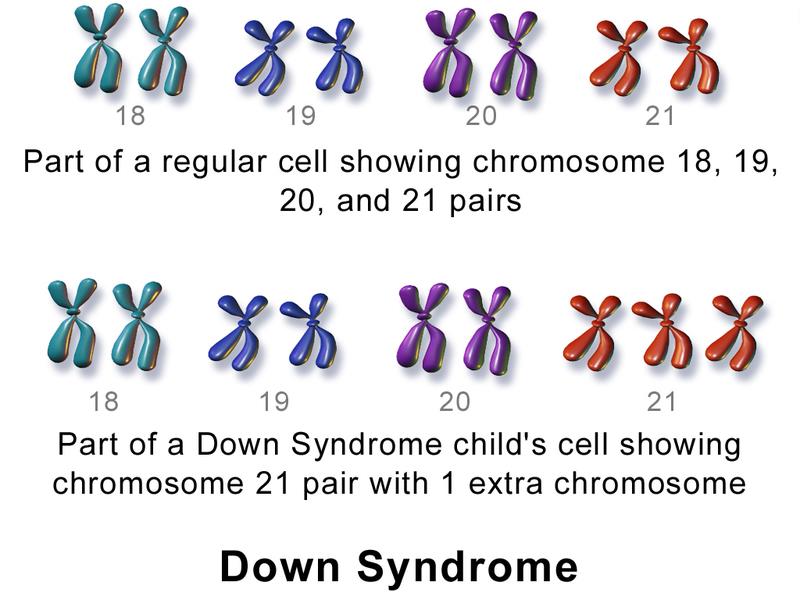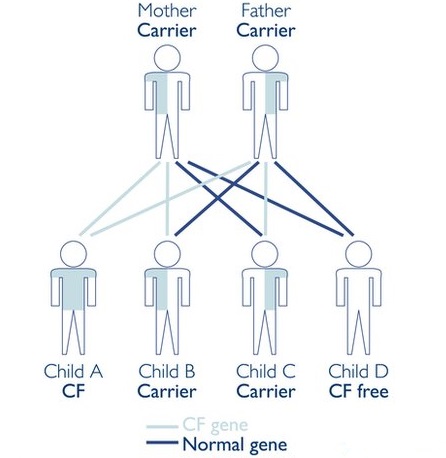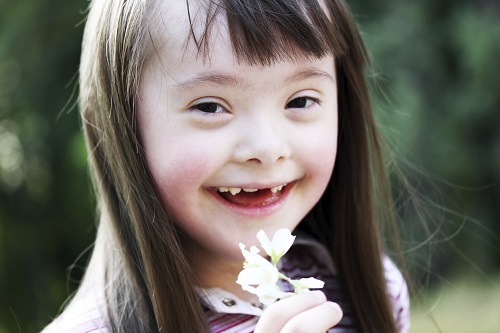Down syndrome is the outcome of chromosomal abnormality that causes intellectual disability, weak muscle tone, and a characteristic facial appearance in infancy. People with this condition have to deal with cognitive delays but the intellectual disability is often mild or moderate. The condition affects one in every 691 babies born in the U.S., and is therefore the most common genetic condition today. More than 400,000 people in the U.S. have Down syndrome and as many as 6,000 babies are born with Down syndrome in the U.S. each year. As it is quite common, many people ask, "How is Down syndrome inherited?" Let's find out more about it.
What Is Down Syndrome?
Every cell in your body contains a nucleus that stores genetic material in genes. Grouped along rod-like structures called chromosomes, these genes have the codes that determine your inherited traits. There are 23 pairs of chromosomes in the nucleus of each cell, and half of these are from each parent. Some people may have a full or partial extra copy of chromosome 21 and this leads to the development of Down syndrome. The course of development changes considerably due to this additional genetic material.

Types of Down Syndrome
There are different types of Down syndrome depending on the way the cell divide itself. Here is more about it:
- Trisomy 21: A baby develops Down syndrome when there is an error in the process of cell division (nondisjunction). Also called Trisomy 21, the type refers to a condition in which there is an embryo that contains three copies of chromosome 21. Under normal circumstances, there should be only two. This happens when a pair of 21st chromosomes does not separate at conception. With the development of the embryo, there will be an extra chromosome in every cell of the body. This is called trisomy 21 and accounts for 95% of all Down syndrome cases.
- Mosaicism: A baby gets this type of Down syndrome when there is a mixture of two types of cells. It means some of the cells will have 46 chromosomes, while others may have 47 chromosomes with an extra chromosome 21. This type of Down syndrome accounts for only 1% of all cases and is quite rare. People with this type of genetic disorder will have fewer characteristics of Down syndrome as compared to those who have Trisomy 21.
- Translocation: It accounts for 4% cases of Down syndrome in which the total number of chromosomes in cells stays normal (46) but there is an additional copy of chromosome 21 attached to another chromosome. This could be a full or partial copy of chromosome 21 and usually attaches itself to chromosome 14. In this type, some characteristics of Down syndrome will be quite visible.
How Is Down Syndrome Inherited?
Not all types of Down syndrome are inherited. Parents can transfer Translocation Down syndrome to their children – the only form of Down syndrome that can be inherited and about one-half of all translocation Down syndrome cases are inherited.

- Trisomy 21 causes this condition where there is a chromosomal abnormality that occurs randomly when reproductive cells form in a parent. The abnormality usually takes place in egg cells but it can also be in sperm cells. In case of nondisjunction, there will be an egg or sperm cell with an additional copy of chromosome 21, and the baby will develop this condition if the same cell contributes to the genetic makeup of the baby.
- It is possible to inherit translocation Down syndrome from an unaffected parent. This happens when the parent has a rearrangement of genetic material in any other chromosome and chromosome 21. This is referred to as a balanced translocation in which there is no loss or gain of genetic material and thus no health problems become evident. This translocation can pass on to the baby and cause imbalance. People with an unbalanced translocation associated with chromosome 21 may have Down syndrome.
- Mosaic Down syndrome is rare and cannot be inherited. It is quite like trisomy 21 and occurs randomly when cells divide early in fetal development. It is for this reason that some cells in the body may have two copies of chromosome 21 and others may have three copies, which will cause problems.
Chances of Giving Birth to a Child with Down Syndrome
 Now you have some understanding of "How is Down syndrome inherited?" you may also be interested in the chances of giving birth to a child with this condition. The condition affects people in all parts of the world irrespective of their economic levels or races. However, it is more common in women who conceive later in their lives. There is a one in 350 chance of giving birth to a child with Down syndrome when a woman becomes pregnant at the age of 35. The chance goes up to 1 in 100 for women becoming pregnant at age 40. At age 45, it is more likely to give birth to a child with Down syndrome because the incidence becomes 1 in 30.
Now you have some understanding of "How is Down syndrome inherited?" you may also be interested in the chances of giving birth to a child with this condition. The condition affects people in all parts of the world irrespective of their economic levels or races. However, it is more common in women who conceive later in their lives. There is a one in 350 chance of giving birth to a child with Down syndrome when a woman becomes pregnant at the age of 35. The chance goes up to 1 in 100 for women becoming pregnant at age 40. At age 45, it is more likely to give birth to a child with Down syndrome because the incidence becomes 1 in 30.
What about the Second Baby?
If one of your babies has Down syndrome, there will be 1 in 100 chances that you will have another child with trisomy 21. In case the father is the carrier, there is a 3% risk of recurrence of translocation. The risk increases to 10-15% in case the mother already has it. Genetic counseling helps in this regard and plays a role in identifying the origin of translocation.
How Is It Treated?
Unfortunately, there is no way to treat Down syndrome. However, the options like speech therapy and physical therapy help people deal with certain issues associated with the disorder. It is important to screen for medical problems usually associated with this order and then opt for corrective surgery to improve quality of life. Enriched environments may also help children live meaningful lives.
